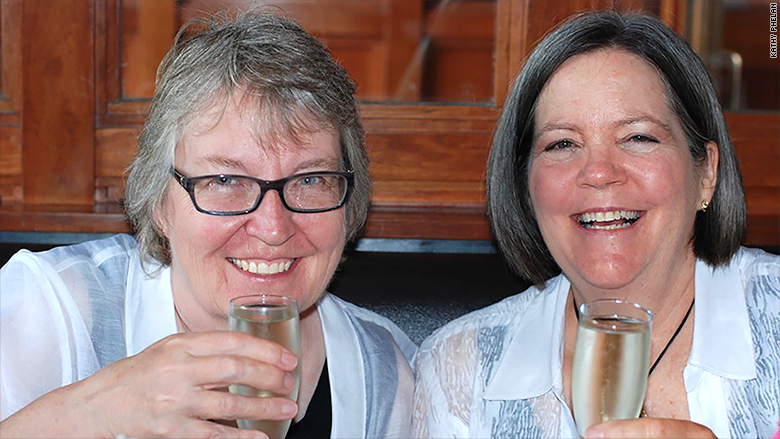
Kathy Phelan has been waiting more than a year for her first benefit check from Social Security, caught in a back-and-forth with the agency as it works to keep up with a changing legal landscape for same-sex couples.
While an 18-month wait is nothing compared to the 33 years that passed before Phelan and her late wife Kaye could legally marry, she thought the landmark Supreme Court ruling in June would speed up the process. Finally, all same-sex couples -- no matter when or where they married -- would be granted the same Social Security benefits as heterosexual couples.
But Phelan's $2,160 monthly benefit check still hasn't been approved, and the holdup is starting to worry her.
"I am frightened that things will change again or I'm not doing something I should be doing. I don't know what I don't know," she told CNN Money.
She last heard from the agency in December and was told it could be another 12 to 18 months before a hearing is scheduled on her case. Her claim was first flatly rejected and she has since appealed.
Phelan isn't the only one stuck in limbo with the Social Security Administration.
"The process is moving inexplicably slowly," said Susan Sommer, an attorney for Lambda Legal, a non-profit that advocates for LGBT rights.
"It's reaching the point where it's offensive for people that have suffered disrespect for so many years and want something as simple as recognition of their marriage," she said.
Related: What marriage means for your finances
There are a number of factors that could contribute to a person's wait time, a spokesman for the Social Security Administration said.
The agency is still in the process of working with the Department of Justice to develop new instructions that will help its workers apply the court's decision to its benefit programs, but attempts to "make all decisions promptly," he said.
Not everyone is waiting, though. Many claims from same-sex spouses who filed before and after the June Supreme Court ruling have been processed.
Over the past two decades, there's been a patchwork of same-sex marriage laws across the country as more and more states made it legal. It wasn't until 2013 when the Supreme Court struck down the Defense of Marriage Act (DOMA) that they could get federal benefits like Social Security as a married couple. But that still left some in the lurch if they were married in a different state than where they lived.
That's what happened to Phelan. They married legally in Washington state in 2013, but lived in Arizona where same-sex marriage wasn't recognized until the middle of 2014. Since Kaye lost her battle with cancer five months before it was legal in Arizona, Social Security did not treat Phelan as her legal spouse. But the most recent Supreme Court ruling made this a moot point. According to the agency, it should no longer matter where or when they were married and benefits should be granted retroactively back to the date Phelan first filed the claim in 2014.
Why, exactly, does that impact Phelan's benefit? Because married couples are entitled to a "survivor" benefit if the higher-earning spouse died first. This can be claimed as early as age 60, two years before you usually can get a Social Security check. It's equal to the total amount of what Kaye's monthly benefit check would have been in retirement.
Related: Companies can still discriminate against LGBT people
Holly Hanson, a financial planner and founder of Harmony Financial Strategies, a firm dedicated to serving the LGBT community, has some clients in similar situations.
"We have had some horrible waiting times, not to mention lack of knowledge around what is available to our clients as benefits from a system they have been paying into most of their lives," Hanson said.
It's unclear just how many people have been waiting like Phelan. She may be in a small boat of people who were legally married in one state, while residing in another that didn't recognize same-sex marriages when their spouse died.
While Hanson acknowledges that it takes time to put a new process in place, she thinks those in limbo have waited long enough.
"It shouldn't take so long because they've been doing it this way for heterosexual couples for years. I think we're getting to the point now that it should be worked out," she said.
Sommer, the Lambda Legal attorney, said her organization is aware of at least a dozen people from across the country who in the past six months have continued to wait for the agency to grant their claims. She herself defended two individuals in similar situations, bringing the cases to court. Both recently got their claims processed after months of litigation.

